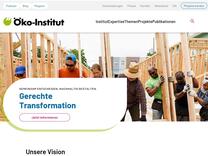EEA Report No 17/2017 | oeko.de https://www.oeko.de/publikation/eea-report-no-17-2017/?tx_form_formframework%5Baction%5D=perform&tx_form_formframework%5Bcontroller%5D=FormFrontend&cHash=d9725c3f83150d0e007e0bdc3032b79e
The 2017 edition of the annual European Environment Agency (EEA) report, Trends and projections in Europe, provides an updated assessment of the progress of the European Union (EU) and European countries towards their climate mitigation and energy targets. The report is based mainly on national data on greenhouse gas (GHG) emissions, renewable energy and energy consumption for 2015, preliminary (‚approximated‘ or ‚proxy‘) data for 2016 and projections reported by Member States concerning expected trends in GHG emissions until 2035. The report was prepared on behalf of the European Environment Agency, as partner of the European Topic Centre on Air Pollution and Climate change Mitigation.
Hannah Förster Gruppenleiterin Mitigation & Ökonomie / Senior Researcher Energie

